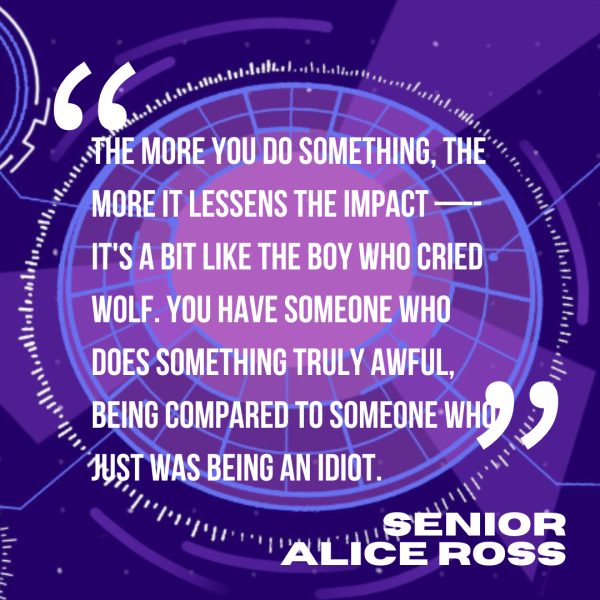A recurring pattern of fake tears, dramatic sighs and a PR written apology. Due to the influx of apology videos, sophomore Samuel Teo has become all too familiar with this rehearsed routine, which is a common response to being canceled. The act of being canceled, according to Oxford Dictionary, refers to publicly boycotting or withdrawing support from a person or organization for promoting beliefs that are regarded as socially unacceptable. Cancel culture is used as a form of social justice where people are held accountable for their actions.With the rise of social media platforms such as X, Youtube and TikTok, the cancellation of public figures on these platforms has been more frequent, the terms “canceled” and “cancel culture” are becoming relevant now more than ever.
In sophomore Samuel Teo’s opinion, the goal of cancel culture is for figures with a platform to reflect on their actions and stop spreading potentially harmful beliefs, which could inflict harm. An example was when former President Donald Trump’s X account got effectively banned after his Tweets sparked the January 1st insurrection on the Capitol building. However, Teo says it is hard to distinguish where to draw the line between what is deemed socially acceptable versus what isn’t, as he believes each individual has their own set of beliefs and values.
“People have different ideas based on their family history or where they were brought up, which shifts their way of thinking and their morals,” Teo said. “However, if their idea doesn’t exactly align with the community that surrounds them, it is immediately deemed offensive. Those are people who usually are ostracized from the society that they are in, which causes them to be canceled. At the end of the day, the First Amendment protects your freedom of speech, and people are entitled to their own opinions.”
Mathew credits the prominence of cancel culture to the emergence of the social media platform TikTok in 2019 as she believes that that was the moment when social media’s influence skyrocketed. According to Mathew, the sudden growth of several social media influencers created a parasocial relationship between users and creators where creators would be held to unrealistic expectations which Mathew says were bound to crumble.
“I feel like a lot of the time cancellation is to make them feel better about themselves,” Mathew said. “They believe that influencers supposedly have a perfect life. They’ve messed up once so people call them out to make themselves feel better about the situation. A lot of the time, especially on TikTok, you see people saying that they’re praying for an influencer’s downfall. There is already a preconceived notion of like, ‘Oh, you’re waiting for this person to screw up.’”
Similarly, senior Alice Ross Ross adds that the advancement of social media and the online network has increased the speed of communication throughout the world. She explains that before individuals find out they are canceled, a narrative will already be cemented, regardless of whether it is true or not.
“I think especially with technology and social media, anything that you say that may be intended for a close friend can be broadcasted publicly,” Ross said. “When you have something that was spreads through word of mouth or a rumor, you don’t get the full context. Just like the way something I say could be directed to someone who understands inside jokes but these inside jokes won’t make any sense to anybody who doesn’t know the context.”
Although someone’s opinion may be misleading, Ross explains how if someone has enough influence to cancel someone, then people will blindly take their opinion instead of forming their own. On the contrary, Ross believes that this is also why public figures with a larger platform or fanbase are more likely to get away with misconduct.
“Suddenly, everybody’s been canceled,” Ross said. “Everybody’s doing something that’s not good and then you have various levels of harm that you bring to the community. The more you do something, the more it lessens the impact —- it’s a bit like the boy who cried wolf. You have someone who does something truly awful, being compared to someone who just was being an idiot. It can very easily become a witch hunt, someone with influence could very easily ruin someone’s life, livelihood, etc. I find that a little scary.”

Teo agrees that the power lies in the public’s hands since they are the ones who get to decide who gets canceled. He believes that this creates a mob mentality where people just jump on the bandwagon of hate without educating themselves of the truth.
“It’s bad if people don’t have their own opinions,” Teo said. “I think that people should definitely do their own research and actually define what they believe in instead of just following because in today’s society, there’s so many different ideas. You don’t know which one to look up to. If you follow the mob mentality, you don’t know what idea you have for yourself, you haven’t found that realization where you know exactly what you believe and what you don’t.”
Likewise, Mathew emphasizes how the mob mentality has reduced the repercussions of cancel culture simply because she has become desensitized to it. In comparison to 2019, when James Charles fell victim to cancel culture after being accused of grooming minors, a claim that cost him several brand deals, over 2 million subscribers and extreme backlash, Mathew feels as if the consequences of cancellation are less severe now since there seems to be a new person blacklisted every day.
“There is usually a period of no posting,” Mathew said. “Then all the hate comments are there and they’re like, ‘Oh, why are they doing this?’ And then there’ll be this really weird apology video that comes out. And a lot of the time people make fun of it because it’s not genuine. And then afterward, everyone will forget about it and move on. They made their apology video and therefore everything is forgiven, and now they can just continue with what they’re doing. And then they just start posting videos like normally.”
To Mathew, apologies like these seem performative and don’t demonstrate any form of growth from the individual. However, Ross affirms that blacklisting someone shouldn’t remain permanent but should insead give an individual time to reflect on their actions and actually make a change. By automatically labeling someone an outcast instead of making an effort to educate them, the actual goal of holding people accountable is gone.
“Cancel culture is useless without the idea that someone can change,” Ross said.“If you were to just label this person a bad person and say, ‘I’m never gonna interact with them again,’ that’s kind of a waste. Just condemning someone, I feel like is not always the best course of action. So talking through it, having discussions like ‘yes, what you did and what you said was hurtful, here’s why.’ And maybe they say, ‘Oh, yeah, that was hurtful, my bad. I won’t do it again.’ And after that, you have one less person saying offensive things in the world. Cancellation should be something that people can come back from.”




















